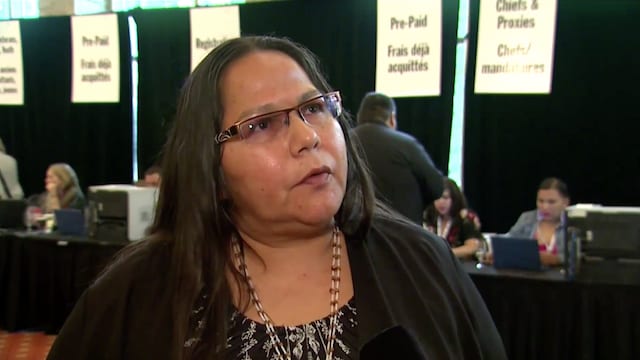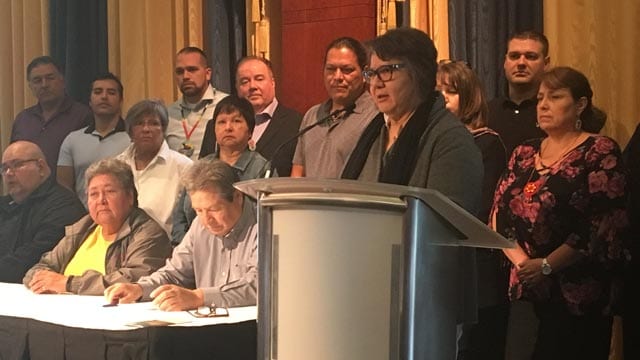
Kukpi7 Judy Wilson of Neskonlith Indian Band confronted Justin Trudeau in Dec. 2018 on Secwepemc jurisdiction and title. APTN file photo.
(Judy Wilson, Secretary-Treasurer of the Union of B.C. Indian Chiefs)
A B.C. chief says a senior bureaucrat told her last month Canada may have already decided to delay tabling legislation related to its emerging Indigenous rights framework until at least next spring.
Judy Wilson, Secretary Treasurer of the Union of B.C. Indian Chiefs and Chief of the Neskonlith Band, told APTN News that during a recent meeting between Senior Assistant Deputy Minister for Treaties and Aboriginal Government Joe Wild and some B.C. chiefs, Wild indicated the feds are not planning to table legislation before spring, and that Canada is planning a “refresh in 2019.”
“I’m thinking that’s post-election,” she said.
Wilson said the meeting happened about three weeks ago, and that Wild said the government would provide “updates and reports” to chiefs at the Assembly of First Nations’ Special Chiefs Assembly in Ottawa early next month.
She also said Wild told B.C. chiefs that in the interim the government will focus on the parts of the framework related to comprehensive claims policies and inherent rights to self-government policies.
A spokesperson for the Crown-Indigenous Relations and Northern Affairs, said the department was working to verify Wild’s statement.
They maintained it’s not Minister Carolyn Bennett’s official position.
On Wednesday media reports claimed the federal government would not pass framework legislation before the fall 2019 federal election.
But they said those reports are “not necessarily accurate,” and that the Liberals “have not ruled out” tabling and trying to pass legislation before the election, which is anticipated in late October.
They did acknowledge the government is “not in a position currently to table legislation, and there’s not very many days of the House sitting left.”
They also said “it’s fair to say it’s unlikely” that Parliament will see legislation before the end of the year.
But in the new year, “if we got to a place where everyone was happy and wanted us to push ahead…things can move quickly,” they added.
On Wednesday Crown-Indigenous Relations issued a statement saying the government is “committed to advancing the framework, and to continue actively engaging with partners on its contents.”
Bennett “is continuing to meet with Indigenous peoples on the Framework — in fact, this week she is meeting with First Nations in Alberta and Quebec,” the statement read.
“This framework will not be imposed on anyone except the federal government. The legislative and policy reforms we are committed to will get Ottawa out of the way so that Indigenous nations and governments can accelerate their path to self-determination.”
Last February Prime Minister Justin Trudeau announced the government would engage Indigenous groups in an effort to “chart a new way forward for our Government to work with First Nations, Inuit, and Métis Peoples and to undo decades of mistrust, poverty, broken promises, and injustices.”
The framework amounts to policy and legislative reform that would “provide clarity and certainty on Canada’s responsibilities toward engaging with Indigenous Peoples,” according to a government news release.
Since that announcement nine months ago Bennett has met with around 1,600 Indigenous people at 100 engagement sessions in every region of the country to hear how each Nation and group would like to see their rights recognized and implemented.
But First Nation leaders, organizations and grassroots people have expressed opposition to the framework, arguing the process for determining what it will look like has been flawed from the beginning.
They say the government is dealing primarily with Indian Act chiefs and not the people themselves.
Some have also argued that the process of privately negotiating with individual groups prevents Indigenous peoples from uniting against any pieces of the framework they say might weaken their inherent Indigenous rights.
Further, there has been no indication from Canada that the framework will include returning sovereignty and jurisdiction to Indigenous peoples over their lands and resources, critics have maintained.
They said the government “can either do this quickly or we can do it right, and we are committed to doing it right.
“We’re more interested in the content than the timeline. This affects people’s lives and it’s important that we get it right. That’s what we’re focused on,” he said.
Story: Bennett fails to calm fears over government’s emerging rights framework
“It could be that come February everyone’s happy with where we are and we could do it,” he added, suggesting new legislation prior to the fall election is still possible.
In order for legislation to be passed into law a bill must be tabled and go through the legislative process before receiving royal assent.
With Parliament not reconvening in the new year until late January, unless a bill is tabled before Christmas it’s unlikely a legislative process would conclude before the fall election, particularly if the legislation is controversial, bulky, or if there is no consensus around it.
Wild did not respond to requests for comment by the time of publication.
Day of Action will go ahead
Organizers of a planned day of action against the framework say their event on Parliament Hill will still go ahead on Dec. 4.
The Association of Iroquois and Allied Indians (AIAI) and Indigenous youth are collaborating on a protest they say will begin at 11 a.m. on Parliament Hill, followed by a march to the AFN assembly downtown Ottawa where youth will make a speech about the framework to chiefs and delegates in attendance.
Chiefs at an all-Ontario Chiefs Conference in Nipissing last June voted to reject the framework and “take all necessary steps to prevent the passing of any legislation…created by the federal government in 2018-2019.”

AFN Ontario Regional Chief RoseAnne Archibald said in September that “First Nations need to lead this process rather than be corralled into a process that the federal government has built.” APTN file photo.
In September, at an AFN forum in Gatineau, Que. dedicated to discussing the framework, AFN Ontario Regional Chief RoseAnne Archibald told reporters Ontario chiefs believe Canada is “not necessarily hearing First Nation voices,” and that “First Nations need to lead this process rather than be corralled into a process that the federal government has built.”
She was joined by AIAI leadership, who also rejected the emerging rights framework.
“The association identifies this as a real threat to the inherent rights and sovereignty of the First Nations in the association and in Canada at large,” AIAI Grand Chief Joel Abram said. “So we feel it’s our duty to act as a harbinger and warn others about the things that we saw.”
AIAI Deputy Grand Chief Gordon Peters said the Trudeau government “hasn’t learned any lessons from anything that’s happened in the past.
“You can’t do top-down, you can’t force something on to our peoples.”
While AIAI members and allies will descend on Ottawa Dec. 4, the Indigenous Activist Network–Idle No More, Truth Campaign and Defenders of the Land–issued a news release Thursday calling for a national day of action across the country in solidarity with the AIAI and youth leading the Ottawa demonstration.
“We ask our Elders, spiritual leaders, youth and adults to come to Ottawa for the Rally or hold an action in your own lands whether you are on the land, in a town or city,” their statement reads.
“Our campaign is about stopping the Trudeau government’s secret, top down ‘Framework’ because it is a direct threat to our sovereignty, our international right of self-determination, our Treaties and our Aboriginal Title and Rights.”









